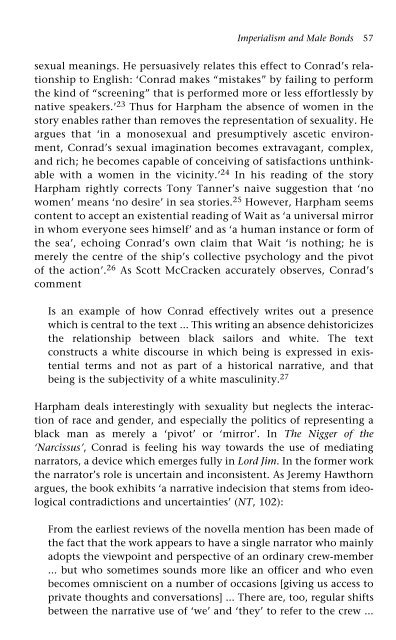Conrad and Masculinity
Conrad and Masculinity
Conrad and Masculinity
Create successful ePaper yourself
Turn your PDF publications into a flip-book with our unique Google optimized e-Paper software.
Imperialism <strong>and</strong> Male Bonds 57<br />
sexual meanings. He persuasively relates this effect to <strong>Conrad</strong>’s relationship<br />
to English: ‘<strong>Conrad</strong> makes “mistakes” by failing to perform<br />
the kind of “screening” that is performed more or less effortlessly by<br />
native speakers.’ 23 Thus for Harpham the absence of women in the<br />
story enables rather than removes the representation of sexuality. He<br />
argues that ‘in a monosexual <strong>and</strong> presumptively ascetic environment,<br />
<strong>Conrad</strong>’s sexual imagination becomes extravagant, complex,<br />
<strong>and</strong> rich; he becomes capable of conceiving of satisfactions unthinkable<br />
with a women in the vicinity.’ 24 In his reading of the story<br />
Harpham rightly corrects Tony Tanner’s naive suggestion that ‘no<br />
women’ means ‘no desire’ in sea stories. 25 However, Harpham seems<br />
content to accept an existential reading of Wait as ‘a universal mirror<br />
in whom everyone sees himself’ <strong>and</strong> as ‘a human instance or form of<br />
the sea’, echoing <strong>Conrad</strong>’s own claim that Wait ‘is nothing; he is<br />
merely the centre of the ship’s collective psychology <strong>and</strong> the pivot<br />
of the action’. 26 As Scott McCracken accurately observes, <strong>Conrad</strong>’s<br />
comment<br />
Is an example of how <strong>Conrad</strong> effectively writes out a presence<br />
which is central to the text ... This writing an absence dehistoricizes<br />
the relationship between black sailors <strong>and</strong> white. The text<br />
constructs a white discourse in which being is expressed in existential<br />
terms <strong>and</strong> not as part of a historical narrative, <strong>and</strong> that<br />
being is the subjectivity of a white masculinity. 27<br />
Harpham deals interestingly with sexuality but neglects the interaction<br />
of race <strong>and</strong> gender, <strong>and</strong> especially the politics of representing a<br />
black man as merely a ‘pivot’ or ‘mirror’. In The Nigger of the<br />
‘Narcissus’, <strong>Conrad</strong> is feeling his way towards the use of mediating<br />
narrators, a device which emerges fully in Lord Jim. In the former work<br />
the narrator’s role is uncertain <strong>and</strong> inconsistent. As Jeremy Hawthorn<br />
argues, the book exhibits ‘a narrative indecision that stems from ideological<br />
contradictions <strong>and</strong> uncertainties’ (NT, 102):<br />
From the earliest reviews of the novella mention has been made of<br />
the fact that the work appears to have a single narrator who mainly<br />
adopts the viewpoint <strong>and</strong> perspective of an ordinary crew-member<br />
... but who sometimes sounds more like an officer <strong>and</strong> who even<br />
becomes omniscient on a number of occasions [giving us access to<br />
private thoughts <strong>and</strong> conversations] ... There are, too, regular shifts<br />
between the narrative use of ‘we’ <strong>and</strong> ‘they’ to refer to the crew ...




